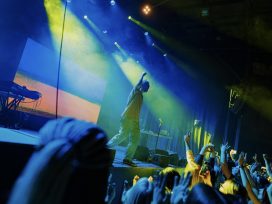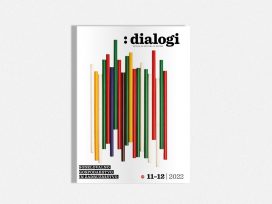Slovene cultural figures and the political elite
The mission of Slovene artists – in fact, not the mission, the right to be subsidized, enabling this mission – is in crisis. It has been publicly denounced almost in the manner of the Inquisition, placed in the dock, as Milan Dekleva, this year’s winner of the Preseren Award, has characterized it. But despite what is commonly believed, it was not the controversial economist Mico Mrkaic who put it there, when he asserted that culture is worth only whatever market price artists can get for their works. What no one wants to acknowledge is that culture has been placed in the dock by the new political elite.
The apologia was offered on the eve of Slovenia’s cultural holiday, during the awarding of the Preseren prizes in Cankarjev dom, the national Congress and Cultural Centre. The responsibility for the burdensome defense was taken on by Dekleva, who sobbed, “Poetry and culture are judged in the name of loss of capital, denounced because we waste money on it which it has not earned and does not deserve. What a foolish judgment!” And it’s true that a day earlier we read this foolishness in the newspaper Delo in an opinion piece by former chief government economic advisor Mrkaic, who suggested that Slovene artists ought to pay for the Preseren Awards with their own money.
The new regime has grafted neoliberal economic policies onto its conservative ideology and style of governing. Given a critical shortage of experts, it has armed itself with a handful of seemingly promising young economists whose acultural nature knows only the poetry of hard cash. Mrkaic’s brutal thesis on the non-necessity of culture that cannot be profitably marketed was only to be expected. But Dekleva’s defense was lacking in conviction. It sounded like the cheap plea of someone who has been insulted, and like a rationalization for the prize, including the money that goes with it, that he had received. The problem is not that the laureate’s lament over the necessity of culture isn’t right. But he is not right to lament. There is nothing wrong if culture fails to yield tangible results that can be measured by the yard and calculated monetarily. Refuting Mrkaic is not difficult, and it has been done many times already, most convincingly by the economist Bogomir Kovac.
More bitter is another realization: that the prospect of an inquisition of Slovene artists had been produced by the very same scene. When the old and new president of the Slovene Writers’ Association, Vlado Zabot, stepped onto the stage of the Zbor za republiko, the intellectual behind-the-scenes service of the ruling party, and helped enthrone it, that was fine. Slovene writers, or at least those associated with Nova Revija, the politically most influential pro-government journal symbolically greeted Janez Jansa. Drago Jancar, one of its editors, assures us that the current political elite is favorably disposed towards culture, and cites some interesting evidence. Why, its members are themselves cultural figures: the Prime Minister is a member of the Slovene chapter of PEN, the foreign minister has published literary works, the minister of culture is a historian… So all is well, then, with the administration, it’s just Mrkaic who needs to be muzzled. What a fallacy! As though after him others of his ilk won’t come. His friend Joze P. Damijan, the neoliberal ex-minister for development, has already resigned? No problem, there is a whole battalion of such people and the government waits eagerly for them to lead us into better, reformed times. Does anyone really think that the views on the cultural mission held by the neoliberals who are so favoured by the administration in power will be any different with anyone else? And this being the case, what are we going to do? Why, we will demand an exception for ourselves!
The problem lies not so much in the new economic creed itself or in the execution of reforms, but rather in the reaction to it by Slovene artists. What are they interested in? The curtailing of human and constitutional rights for asylum-seekers, Roma, the erased, and homosexuals simply do not register on the radar screen of these literati, otherwise well-refined and sensitive souls, the icons of the Slovene intelligentsia. Nor does the increasing government control of the media and the economy. The evident lowering of democratic standards in all spheres is apparently acceptable for them, given their silence on the subject. Is it reflected in their creative works? Possibly. Are they powerless? That’s hard to believe, if we recall Zabot’s words at the round table hosted by the Slovene public broadcasting service a year ago, when he threatened: if we writers take to the streets, we can topple the government!
And yet, with a few honourable exceptions, the Slovene cultural community operates on the principle of a deep (presumed) apoliticism. It’s like a cat that meows only when someone steps on its tail. The outside world begins to exist only when it calls into question the justification for subsidizing culture. So all is well with the state feeding trough so long as it provides the money for their art. They are friendly towards it and refrain from criticizing. They agree with it. If it threatens to cut off funding, then Slovene artists indulge in a little fit of anger. But nothing too serious. And even if the description above is exaggerated, a caricature, there is something else going on here: the quiet disciplining of artists. When brutal self-doubt sets in and takes away their identity and credibility, then a little lamentation can gain some of it back. But they fail to note that their area of freedom is narrowing similarly as for other professional, guild, economic, or political groups. Since Slovene artists do not express solidarity with others, no one feels solidarity with them. Practically speaking, all the appeals against the “Mrkaicization” of views on culture which have been expressed one after another are exposed as having been staged for the benefit of the political elite, the message being: be careful not to take this too seriously! Those who made them were either apolitical or collaborationists. With respect to the first, artists (mostly authors) have shown that the limits of their sensitivity overlap completely with their concern for themselves. Total political apathy – I don’t care what you do so long as you take care of us! With respect to the second, the appeals were expressed from a position of flirting with the government, from a shared commanding stage. Not a single one, neither among the first group nor the second, has attacked neoliberalism as a goal of the system, as something that it aspires to be. It would be sad and grotesque to hold the first position, when we remember that culture has always been a Slovene trademark and helped shape the path to national political independence. Is the second hypothesis, then, on collaboration, accordingly more likely? And if it is, then who would take this lamentation seriously?
We will remember this year’s sixtieth annual awarding of the Preseren prizes for something else in addition to the re-awakened identity of the new neoliberal enemy through the eyes of Slovene artists. They will go down in history as a missed opportunity: we Slovenes owe a debt of gratitude to Gorazd Kocijancic for his elegant translation of the whole of Plato’s works into our language. Exactly fifty years ago Anton Sovre won the award for his translation of just three dialogues by the Athenian philosopher. That’s a lot, but it’s a lot less than the 3200 pages of Kocijancic’s opus. Members of the expert committee of the Preseren Fund simply overlooked this colossal achievement. Yes, but that is another story.
Published 12 June 2006
Original in Slovenian
First published by Dialogi 3-4/2006 (Slovenian version)
Contributed by Dialogi © Boris Vezjak/Dialogi Eurozine
PDF/PRINTNewsletter
Subscribe to know what’s worth thinking about.



